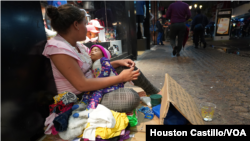Night falls on the streets of San José and uncertainty takes over Júnior Castillo, a 27-year-old migrant, originally from Yaracuy State, San Felipe Municipality, Venezuela.
He recently learned of the United States measure to close the borders to Venezuelans, after announcing an orderly migration plan, although he says that he is clear about few things that have been passed on to each other by word of mouth.
This man spends the night in the streets of San José along with nine other people, including his little son “Felipe”, with the uncertainty of whether or not to continue his trip to the United States, after learning of the measure.
“The little we know about the measure recently announced by the United States is what we have also heard from people who have communicated with us because this is a chain,” he says.
“We heard is that it is a measure that was being implemented with the people of Ukraine as well, which was to have a sponsor already in the United States residing with a stable economic status who could receive a person and then make the request of the person who is there, who is willing to enter the United States. That is what we have heard,” says the distraught man.
The new United States program consists of allowing the legal entry of 24,000 Venezuelans sponsored by solvent individuals into its territory and seeks to discourage irregular migration on its southern border, which has increased to historic levels in recent years.
The number of refugees and migrants from Venezuela around the world has exceeded 7.1 million and the exodus continues in the absence of a solution to the political crisis in the southern country.
Angela Marcano, 22, is another Venezuelan migrant who is in another point of the Costa Rican capital, which is where in recent months they have decided to stop to collect money to continue their destination to the United States.
The woman, who also carries her two-year-old daughter, is still incredulous about the news that her colleagues told her that they would not allow the irregular entry of more Venezuelans through the southern US border, or at least that is what she tries to make herself believe.
“In truth, I don’t know who to believe because of so many things they have said. Let’s wait to see what happens, let’s wait for the people who are going up to see if it’s true. Only God knows why he does things. If he has us here, it’s for a reason. If he advances us, he advances us; I don’t know. In truth, in my place, I will wait to see what happens”, says the woman.
According to this woman, if she manages to confirm that the United States will not allow the entry of migrants, she will stay in Costa Rica before moving further to Mexico, where she affirms that the shelters are exhausted.
“I prefer to stay here, settle down here, look for a job here, work humbly to wait for that to calm down because, in truth, it would give me something that everything I went through the jungle with my daughter and my partner to later reach a place for them to deport me like this, it’s not fair,” he says to the VOA and adds that it is clear that “each country does what it wants because it is its territory.”
“I’m not in a hurry, I’m not in a hurry to continue. I stayed here in Costa Rica to ask for a collaboration to complete a ticket to move forward with my girl, but if you can, no way, ”she adds.
She is accompanied by another 18-year-old girl, who identifies herself as Mariela de los Ángeles Carinoy. Like Marcano, she is disheartened by the news she recently heard.
“The situation is a bit difficult, but not only in the US, crossing the border between Costa Rica and Nicaragua is also complex. My sister passed by and sent me some videos, she told me that it was difficult, that you were walking through a piece of jungle like the one we were walking in Darién, she rather told me that she wanted to go back for everything that is happening”, she indicates.
The United States measure comes at a time when Costa Rica announced a plan that will facilitate the transit of Venezuelans heading to the United States.
President Rodrigo Chaves said at a press conference that the country “faces a migratory crisis”, for which he will soon provide buses that will take migrants from their entry into Costa Rica through the border with Panama, to a point near the border with Panama. Nicaragua to continue their transit.
According to the Government, 2,500 migrants could be entering Costa Rica per day, but the figure could reach 10,000 at the rate it is going.
Connect with the Voice of America! Subscribe to our channel Youtube and turn on notifications, or follow us on social media: Facebook, Twitter and Instagram
















